Top Rankings
Mount Vernon School District ranks among the top 20% of public school district in Washington for:
Category
Attribute
Community Size
Largest student body (number of students) (Top 1%)
For the 2025 school year, there is 1 public preschool serving 163 students in Mount Vernon School District.
Public Preschools in Mount Vernon School District have a diversity score of 0.54, which is less than the Washington public preschool average of 0.71.
Minority enrollment is 68% of the student body (majority Hispanic), which is more than the Washington public preschool average of 54% (majority Hispanic).
Overview
This School District
This State (WA)
# Schools
14 Schools
801 Schools
# Students
6,441 Students
280,418 Students
# Teachers
395 Teachers
17,799 Teachers
Student : Teacher Ratio
16:1
16:1
District Rank
Mount Vernon School District, which is ranked within the bottom 50% of all 306 school districts in Washington (based off of combined math and reading proficiency testing data) for the 2021-2022 school year.
The school district's graduation rate of 84% has increased from 71% over five school years.
Overall District Rank
#246 out of 307 school districts
(Bottom 50%)
(Bottom 50%)
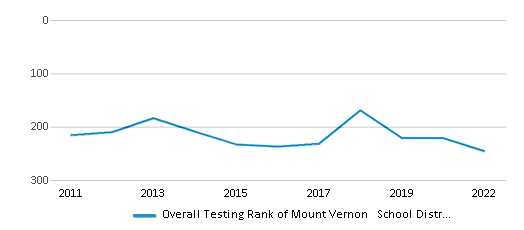
Math Test Scores (% Proficient)
26%
40%
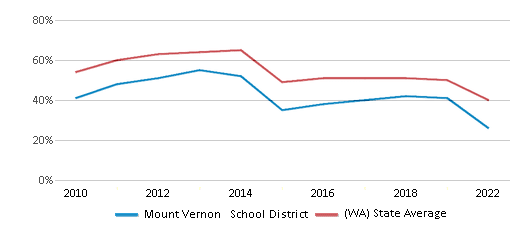
Reading/Language Arts Test Scores (% Proficient)
34%
53%
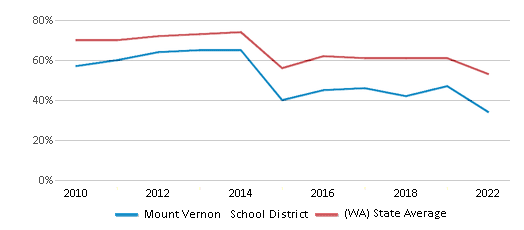
Science Test Scores (% Proficient)
34%
49%
Graduation Rate
84%
84%
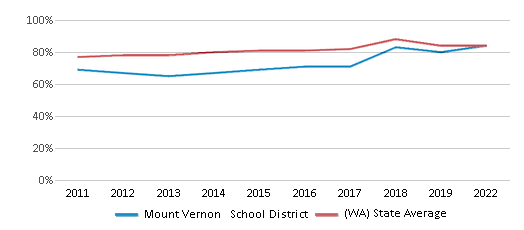
Students by Ethnicity:
Diversity Score
0.55
0.71
# American Indian Students
24 Students
2,844 Students
% American Indian Students
n/a
1%
# Asian Students
134 Students
25,971 Students
% Asian Students
2%
9%
# Hispanic Students
3,742 Students
73,094 Students
% Hispanic Students
58%
26%
# Black Students
77 Students
16,473 Students
% Black Students
1%
6%
# White Students
2,224 Students
129,086 Students
% White Students
35%
46%
# Hawaiian Students
60 Students
5,103 Students
% Hawaiian Students
1%
2%
# Two or more races Students
179 Students
27,229 Students
% of Two or more races Students
3%
10%
Students by Grade:
# Students in PK Grade:
119
23,952
# Students in K Grade:
415
43,573
# Students in 1st Grade:
452
42,048
# Students in 2nd Grade:
475
43,955
# Students in 3rd Grade:
444
39,809
# Students in 4th Grade:
473
41,098
# Students in 5th Grade:
440
39,252
# Students in 6th Grade:
444
3,085
# Students in 7th Grade:
458
1,010
# Students in 8th Grade:
458
1,067
# Students in 9th Grade:
550
319
# Students in 10th Grade:
543
337
# Students in 11th Grade:
555
333
# Students in 12th Grade:
615
580
# Ungraded Students:
-
-
District Revenue and Spending
The revenue/student of $20,435 is higher than the state median of $18,796. The school district revenue/student has stayed relatively flat over four school years.
The school district's spending/student of $20,167 is higher than the state median of $19,246. The school district spending/student has stayed relatively flat over four school years.
Total Revenue
$132 MM
$20,715 MM
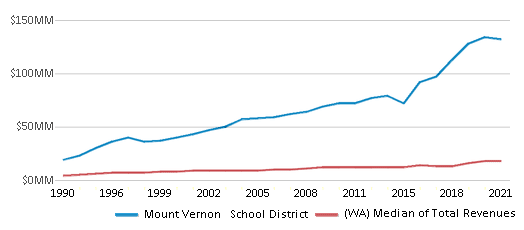
Spending
$130 MM
$21,212 MM
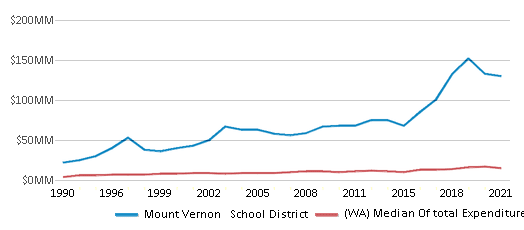
Revenue / Student
$20,435
$18,796
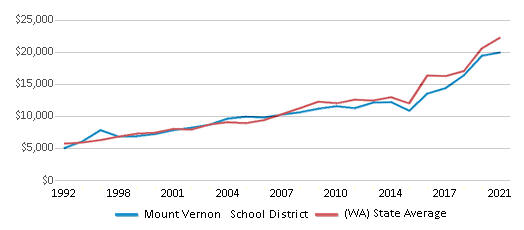
Spending / Student
$20,167
$19,246
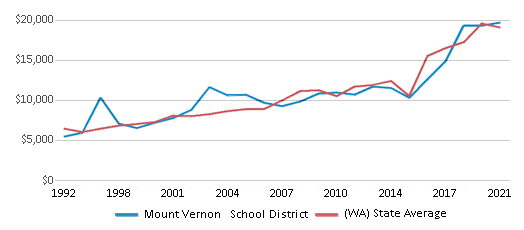
Best Mount Vernon School District Public Preschools (2025)
School
(Math and Reading Proficiency)
(Math and Reading Proficiency)
Location
Grades
Students
Rank: #11.
Mount Vernon Special Education
Special Education School
(Math: <50% | Reading: <50% )
Rank:
Rank:
4/
Bottom 50%10
920 S 2nd St
Mount Vernon, WA 98273
(360) 428-6141
Mount Vernon, WA 98273
(360) 428-6141
Grades: PK-12
| 163 students
Recent Articles

Year-Round Or Traditional Schedule?
Which is more appropriate for your child? A year-round attendance schedule or traditional schedule? We look at the pros and cons.

Why You Should Encourage Your Child to Join a Sports Team
Participating in team sports has a great many benefits for children, there is no doubt. In this article you will learn what those benefits are.

White Students are Now the Minority in U.S. Public Schools
Increasing birth rates among immigrant families from Asia and Central and South America, combined with lower birth rates among white families, means that for the first time in history, public school students in the United States are majority-minority. This shift in demographics poses difficulties for schools as they work to accommodate children of varying language abilities and socio-economic backgrounds.





